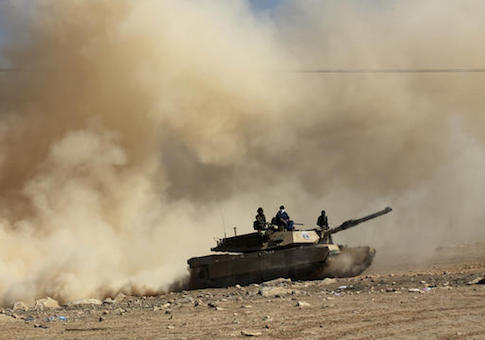The United States needs to continue its commitment to train and equip Iraqi security forces in the coming years to prevent the reemergence of the Islamic State after its anticipated defeat by coalition forces in Mosul, an expert on the region testified Tuesday.
Michael Knights, a fellow at the Washington Institute for Near East Policy who has worked extensively with the Iraqi military, testified to the Senate Armed Services Committee that it is critical for the United States to prioritize its military operation in Iraq before turning to political solutions.
"You've got to have security first and then you do the rest. Without security you have nothing, you've got no base to work off of," Knights said.
"It's important to attack [ISIS's] ideology, etcetera, etcetera, that is important, but what's more important is to show them to be losers, to beat them on the battlefield publicly, and to prevent them from reemerging," he added.
Knights pushed back against the widely held notion that ISIS was able to seize a third of Iraq by 2014 because of Sunni disenfranchisement with the Shia-led Iraqi government or isolation at the local level. He blamed substantial weaknesses in the Iraqi security forces, exacerbated by the U.S. troop drawdown, for the terrorist group's advance.
"Local people looked at ISIS and said, 'They're strong, local security forces are weak.' They didn't say, 'I wish the Constitution could be amended so that the Ba'ath Party wasn't illegal anymore,'" he testified.
Defense Secretary James Mattis and Lt. Gen. Stephen Townsend, the top U.S. commander in Iraq, have pledged that the U.S.-Iraq relationship will endure for years to come, but Kurdish officials have expressed anxiety that Americans' interest in the region will wane once Mosul has been recaptured.
Kurdish apprehension stems from the Obama administration's 2011 decision to withdraw American forces from Iraq after assessing that al Qaeda no longer posed a threat to the United States. Republicans and military officials have condemned the move as a catalyst to ISIS's emergence in the region.
Knights warned against repeating that mistake, stating in written testimony to the committee that the U.S.-led coalition's continued attention to Iraq "is simultaneously the cheapest and the most important investment that can be made in Mosul."
He testified that U.S. assistance to Iraqi security forces would not only help to defeat ISIS and win battles in the near term, but would prevent the terrorist group and other jihadist insurgencies from regaining control down the road.
"We need to develop security forces first that can control the place, stop ISIS from coming back, stop the Shia militias from taking over, stop people from being afraid, then move to the next stage of getting some of the finer points of the politics and the building of the nation," Knights said.
